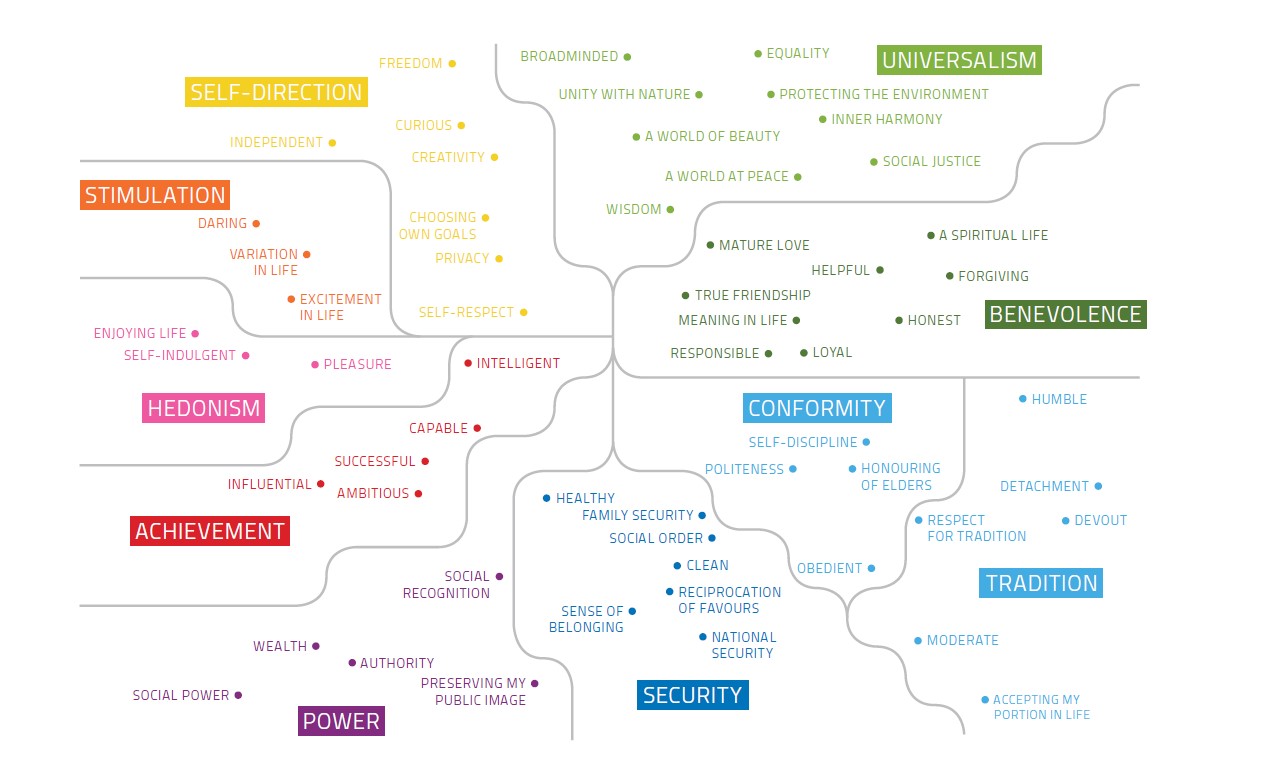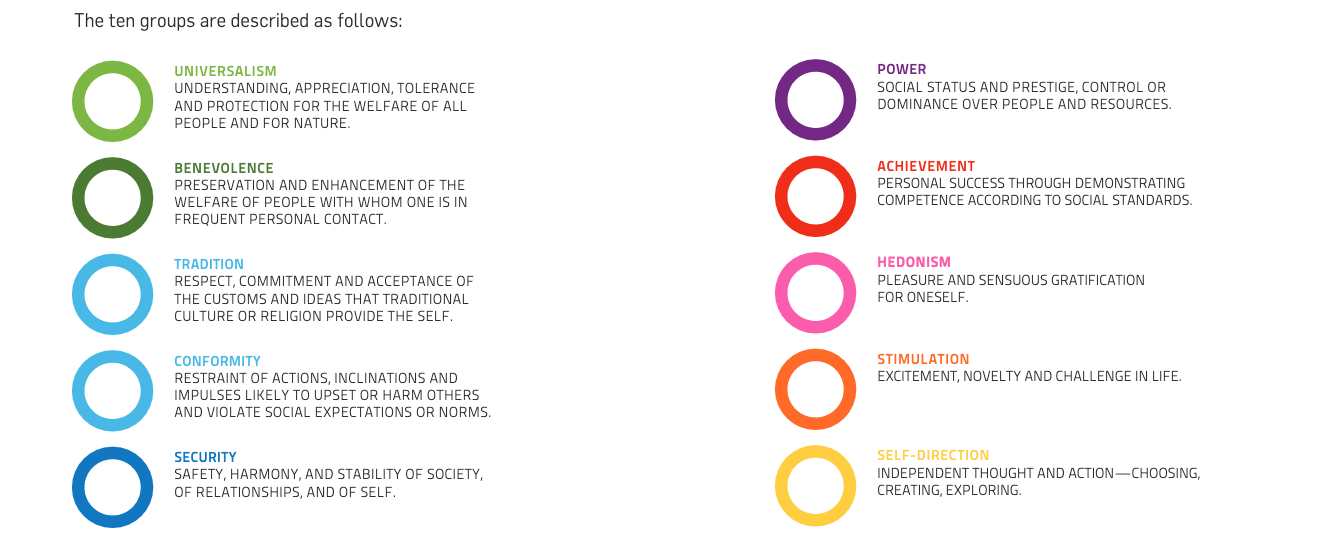Want to dive a little deeper?
Here's a quick tour of what personal values are (and aren't), what we're pretty confident we know about them, how understanding your values can help you avoid burnout and set yourself on a path to flourishing, and how the values tool works.
Quick links
- What are personal values?
- What we know about values
- How understanding values can help
- How the values tool works
Remember we're talking about personal values here, not cultural or social values. Here's the difference: social values are the ones most people in a given community would agree are important, while personal values operate as a system of priorities that's unique to you. Personal values kick in where basic social expectations have been met, and you have to make choices about two courses of action that might be equally socially acceptable. On any given list of personal values, most or all of them will probably be important to you, to some degree; it's just some of them will be more important than others. It's often when two or more of them come into conflict that you become aware of them.
It might help to take an example: in western industrialised society, two broadly shared values are “working hard” and “providing for my children”; people who don't appear to live by those values are a favourite topic for scandalised talkback radio segments. But so long as you're working hard enough, and your children are adequately provided for, you're free to choose whether to prioritise work, serving values like achievement or wealth, or to make more time for family, serving values like caring for others. You might find a way to combine achievement with caring for others so you don't have to trade those values off. And you might make those choices differently at different stages of your life.
A reliable sign you're operating in personal values territory is the “damned if you do, damned if you don't” phenomenon, which you may have spotted in the example above. If whatever you choose to do in a given situation seems to draw judgement from someone, what you're seeing is different personal values systems in action. It pays to be clear what yours are and how they've guided your decisions, so you can see quickly where someone else is simply applying a different yardstick from yours.
Personal values work in a fairly well-understood systemYou might already have used a guide to identify your personal values. There are quite a few of them around. They tend to offer long, pretty loose lists of values that mix the social with the personal, provide some high-level guidance on making a shortlist, and then ask you to condense until you have the few values that seem most important in the moment.
That approach is fine as a starting point, but it misses a body of research that illuminates values as a system of priorities, which in turn is helpful in putting them to more powerful use. Shalom Schwartz first published his cross-cultural values model almost 30 years ago, and while it's had some adjustments, the basics aren't controversial: ask thousands of people in hundreds of countries what's important to them, and not only will they give you variations on ten or so core themes, those themes relate to one another in predictable ways.
It's useful to understand those themes and patterns, because groups of values can be mutually reinforcing or relatively independent (so trade-offs tend to be low-stakes) or they can be in direct opposition, which is often where they start to generate some stress. You can see those relationships in this beautiful graphic from the Public Interest Research Centre's Common Cause Handbook, which is based on Schwartz's research:
 Reproduced under a Creative Commons Attribution Share Alike license creativecommons.org/licenses/by-sa/3.0/
Reproduced under a Creative Commons Attribution Share Alike license creativecommons.org/licenses/by-sa/3.0/
Twenty-something individual values cluster into the ten themes, around what Schwartz called a circumplex - a graphical representation of how likely it is that different values will be strongly held by the same person at the same stage of their life. If you're strong on equality, for example, it's more likely you'll also be strong on protecting the environment than you will be on wealth or success - that is, you'll skew towards universalism over achievement or power. That doesn't mean achievement or power aren't important to you at all, just that when it comes down to a choice, you'll usually lean towards the greater good.
You can see how conflicting values will drain your time and energy: if you value creativity but your paid work has you following rules and processes that reflect values like obedience and respect for tradition, for example, not only will you spend time and effort at work managing your own frustration, you will also need to find more time outside of work to pursue something more creative.
Christina Maslach, the Berkeley psychologist who pioneered burnout research, touched on this nearly 25 years ago when she observed that values mismatch plays a key role in burnout:
The smaller the overlap between individual and organizational values, the more often staff members find themselves making a trade-off between work they want to do, and work they have to do… The strain associated with an enduring mismatch of values depletes personal energy, reduces involvement, and undermines personal efficacy or accomplishment… Insufficient opportunity to pursue personal values through work requires staff members to overextend themselves in other areas of their lives in pursuit of meaningful contributions.Understanding (and taking seriously) your own value system is like a ticket on your own personal EACIf you've seen Finding Nemo, you'll remember the predicament two very small fish find themselves in: how to travel 2,000-odd kilometres down the east coast of Australia in time to rescue another, even smaller fish? Answer: the East Australian Current. Luckily for Marlin and Dory, the EAC happens to be going in exactly the right direction, depositing them at their destination with next to zero effort.
Ignoring your personal value system is a bit like ignoring the EAC. You might stumble into it by accident, but you're much more likely to end up doing things the hard way.
You can still choose to do things the hard way, of course. You might choose to trade off short-term against long-term goals and settle for paid work that's not as values-aligned as you'd prefer. The magic is in being clear that that's what you're doing. The choice is going to take it out of you, so you'll need more recovery time. You're going to need to build in the rests - more so than if you were doing something more aligned, and maybe more than others around you.
Being clear on your value system gives you current-detecting goggles: in the vast ocean of things you could be doing with your time, what's taking you in the right direction? Finding the right current, with the right travelling companions, is your fast track to flourishing.
Here's how the values tool worksThe values tool walks you through four simple steps, which should take about 10 minutes. You might want to save it up for a brain break and a cup of tea.
We ask you to sign in or sign up before commencing the survey so we can save your work for you.
Find your core values: we've used Schwartz's values survey to get you started, with some minor language modifications for clarity and inclusiveness.
This survey has 21 questions and should take about 5 minutes to complete.
You'll also get the opportunity to edit or adjust so that the values you end up with are meaningful to you.
Activities: Enter roughly how much time you spend on your top three or four activities in an average week. This doesn't have to be perfect, but should represent where most of your time goes.
Alignment: We'll help you assess how strongly each of your main activities aligns with each of your core values. The tool uses these inputs to give you an alignment score for each value, weighted by the amount of time you spend on each activity.
For example, if you're spending 40 hours at work and 10 hours on your side project, the alignment rating you give for each of your core values at work is weighted four times as heavily as the ratings you give for the project. 100% alignment with a given value would mean all your activities are strongly aligned with that value.
Plan: Review the alignment summary, see if there are any gaps you want to fill, and use our template and prompts to make a plan that helps improve your alignment.
Save your plan so you can check back to see how things have changed, and get suggestions for other changes you might like to try.
 Values
Values© 2025 Anamorphic Digital Pty Ltd, All rights reserved.
